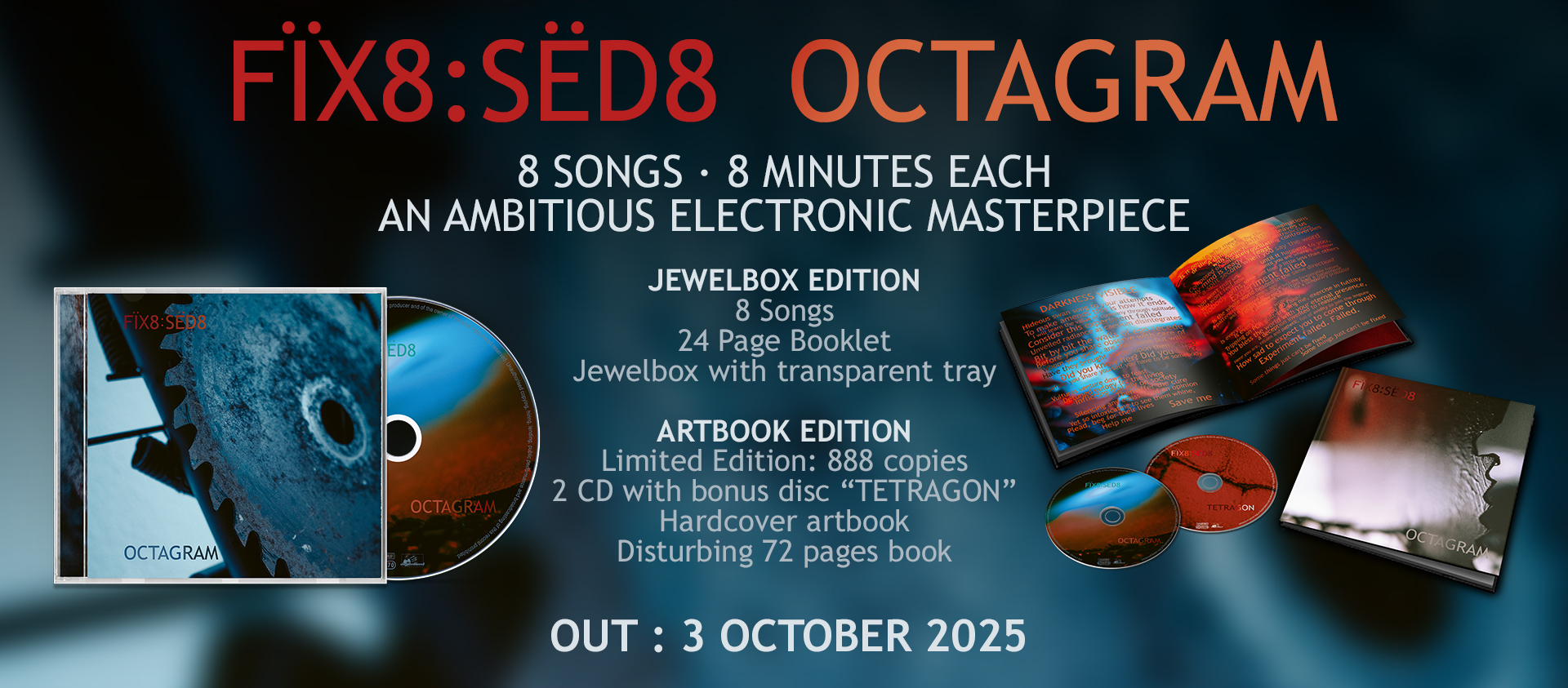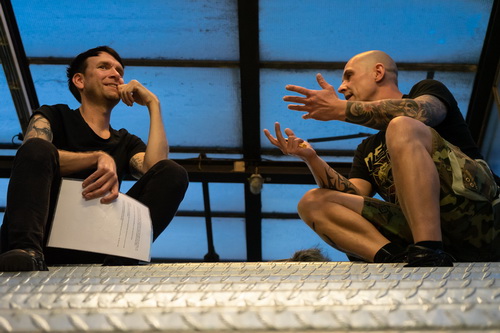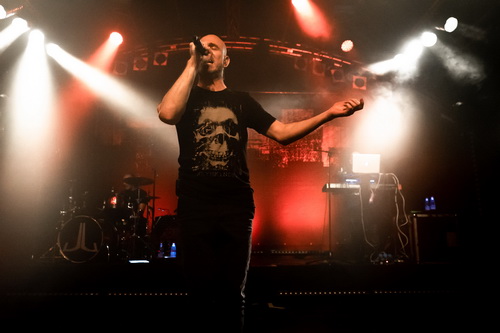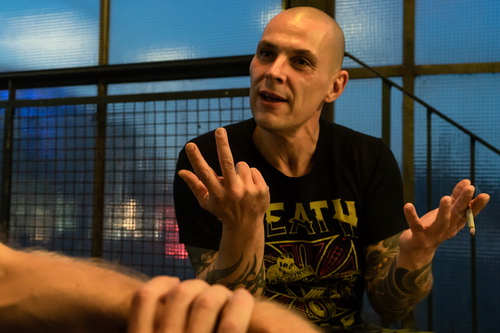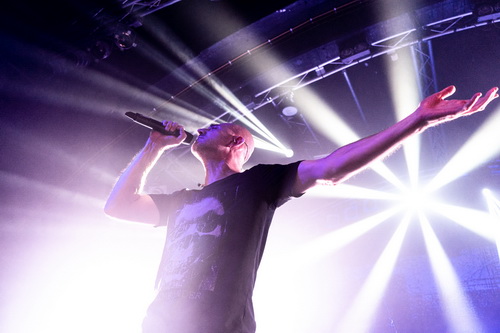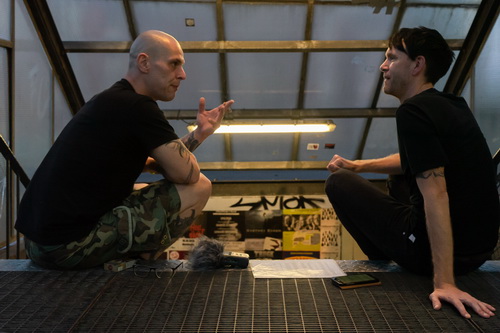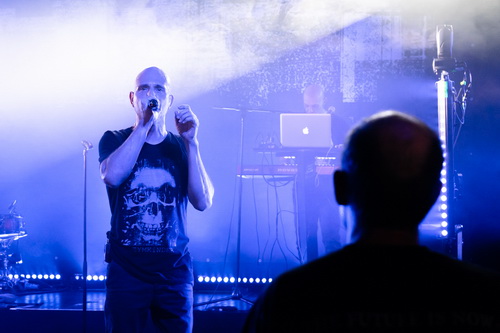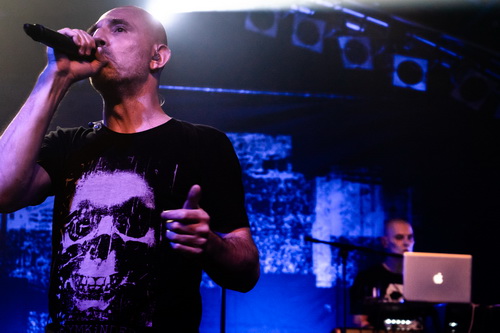
Twentyfour years ago, De/Vision released their debut album “World without End” and the synthpop duo started six years prior. So 2018 they celebrate their 30th anniversary and when they made a stopover in Hamburg on their “Citybeats Tour” Release sat down with Thomas Adam from the band. He talked about their long career and diminishing record sales in the digital age. We also shot some exclusive interview and live pictures.
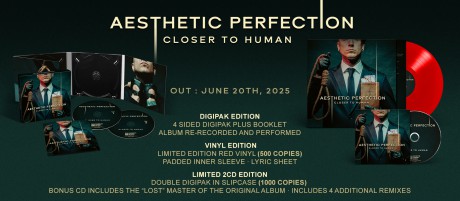
Last band standing?
It’s not only an album tour you’re on at the moment, this is also a celebration of De/Vision’s 30th anniversary. How can you possibly summarize such a long career? You must have reflected about this several times.
- Oh fuck, haha! The point is that those years have passed so fast and it’s hard to comprehend the fact that we’ve been doing this for thirty years now, it’s amazing. There’s not many bands being around for such a long time; we’re kind of proud of it.
But it has also been a hard time; we’ve really experienced the ups and downs of the music business. When we started people were still buying CD:s, there was no digital music or people downloading stuff; we saw CD sales go down, saw the whole market go down actually. But we’re proud still being here after such a long time because we’ve had a great fanbase over the years and have done a really good job.
But when did you start to realize that “Hey, we’re going to do this for many decades to come”?
- I don’t know what Steffen thinks about that but I have always lived day to day and never really cared about what happened the last year or what will happen tomorrow. And one day I just woke up and realized “Oh my god, it has been thirty years now”, haha. I’m happy that we’ve survived the course of time. There were many bands starting at the same time as us but they’re all gone, we’re the only one left.
Not sure about that, but what is also interesting is that when I compare you to many new German bands on the scene today, most of them sing in German. There are bands singing in English today as well but my impression is that most “synth scene” bands in Germany in the eighties and nineties aimed for an international career thus writing lyrics in English. Was English a natural choice for you from the beginning?
- That was basically the only reason why we picked up English. We didn’t want to make music just for German fans, it was more interesting to reach out to people across the world for us. People in Australia and South America should also be able to understand our music. One fun thing though is that countries as the UK or the US love German lyrics and German bands, haha.
Most bands that turned up on the synthpop scene always had to hear never-ending references to Depeche Mode. I know it from Swedish bands as The Mobile Homes for instance. How have you experienced that kind of comparisons? Or did you find it possible to stand on your own already from the beginning?
- It was exactly the same of course, haha. It was pretty hard from the beginning and it really took a while before people saw us for what we did and not Depeche Mode. And it’s a bit weird because it wasn’t Depeche Mode who started electronic music, we had Kraftwerk as inspiration as well. Some of their songs have a traditional song structures, just like “The Model”, with verse, chorus and bridge although not all of their songs are like that.
Depeche Mode on the other hand were probably one of the first electronic bands that had proper song-writing that was perfect for radio stations. That may be one of the reasons why every synthpop band were compared to Depeche Mode. After all, they were the band that made synthpop popular.
But when did those comparisons to Depeche Mode came to a halt for you?
- They still happen at times but most people have accepted that we’re not a copy of Depeche Mode. We’re in the same music genre but nothing else. We’re not looking at Depeche Mode and say “Oh, what have they done now, let’s write a new album”, just to become more popular. Some bands do it that way just to get more attention but it won’t work in the long run. But we still hear people say “This song reminds me a bit of Depeche Mode’s ”Personal Jesus” phase”, but most people today see De/Vision as a band doing their own thing.
“Every day is a hard working day”
Although the genre has evolved beyond the song-writing techniques and the aesthetics of the eighties, De/Vision are still one of the most productive bands after all these years. “Citybeats” is the band’s fourteenth album since their debut in 1994. Thomas explains that there is more than their own creativity behind the sound of De/Vision, and the recipe lays in having a good team to work with.

Your discography reveals a very productive and creative spirit in De/Vision. You have released fourteen studio albums in thirty years, that’s a new album every second year, and then we haven’t considered singles, EP:s and live albums on top of that. That’s kind of productive.
- That’s because of what I said before; the music industry changed, record sales changed and you have to be productive. We’re not Depeche Mode who can afford to only release an album every fifth year, we have to release stuff more often. But we have always been very productive. Steffen is the main songwriter and use to say “Hey, when the tour is over and I’m back home there is nothing else to do and I’m a musician so I write music”. You can’t just sit there and just wait for a creative moment to happen, it’s actually hard work. Every day is a hard working day, almost like an office job where you work nine to five whether you’re inspired or not. That’s why we can release albums almost every two years.
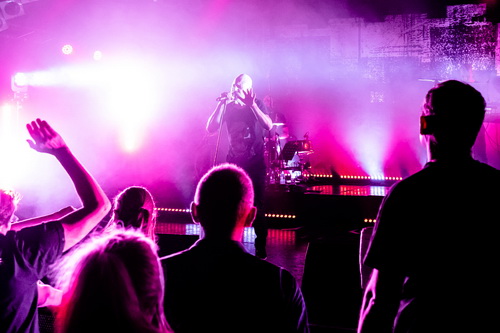
What I always considered to be your strength is the how you re-invent electronic pop music with all these tiny sounds and details in your productions. To me, albums like “Void”, Popgefahr” and “13” were really great productions. How do you work with it?
- I need to be honest about that; what you here on record is not how it sounds at home. Our producers, like Ken Porter and Stan Cotey, add lots of stuff to the songs and that’s really important to us. We’ve never been that kind of band saying “We want it to sound exactly as we did it on the demo”, our producers have always been a big part of what comes out in the end.
We always tell them “Hey guys, this is the demo and now it’s your turn. Do whatever you want and if we don’t like it we’ll tell you”. That’s how we do it, without having complete control over the songs.
You made a turn as many synthpop acts did and started to put on more guitars after a few albums. But how was it received by fans? I remember that synthpop and guitars were thought to be two separate entities a bit into the nineties.
- That’s a good question because already on our first album, “World without End”, we had guitars but they’re more in the background of the songs. Listen to “Try to Forget” and there is one in there somewhere, haha. But people liked it and I don’t think it was a big thing when we started to use guitars because many other synthpop bands already did it.
But we had these phases where we’ve been like “This album has to be strictly electronic” and other times it’s “More guitars this time, much more guitars!”. It was never planned though but depended on the songs. You just hear it, “This song needs a guitar somewhere, let’s put it in”.
Downhill for synthpop?
Synthpop has turned into “something else” and fused together with other genres thus creating new musical directions in which bands rarely label themselves as synthpop bands anymore. And for Thomas there is a difference between synthpop and modern electronic music when it comes down to song-writing. The question is how synthpop is received among fans today.
You probably heard the question about how you have evolved from “World without End” in 1994 until today but let’s have another take on it. Synthpop as a genre has changed during these years and you were part of that transition into “something else”. What happened with the genre?
- What I feel when I go to festivals, let’s say Amphi or M’era Luna, is that there’s a new kind of electronic music which basically started with futurepop, and that’s something else than what I’m used to. In a way I miss traditional synthpop bands. These bands rooted in futurepop sounds the same to me. One band started the whole genre and got famous for it, and there were hundreds of copycats after that which all wanted to ride on that wave of success.
Traditional song-writing has started to disappear and everything is influenced by club music today. I just don’t know where or when traditional song structures got lost.
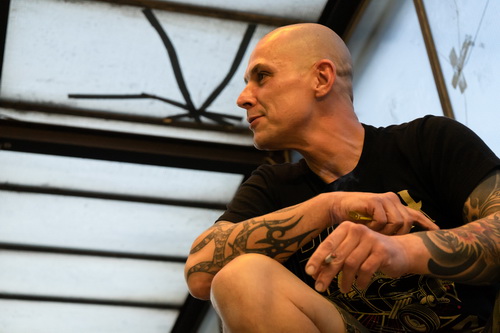
How has this change affected De/Vision both in terms of economy and fanbase?
- It has affected us just like any other band. Sure, bands like Depeche Mode still sell lots of CD:s and other merch, and they probably earn a lot of money from music downloads, but for a band of our size it’s of course very difficult. We’re not a top-ten chart band and we’re not selling millions of CD:s, and of course it was a painful transition both with changes of the overall genre but even more because of digital music.
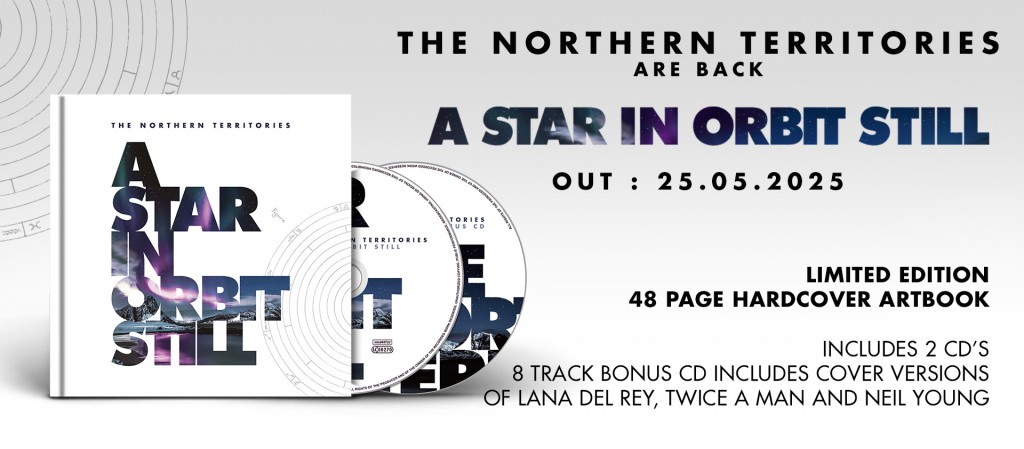
We clearly saw how CD sales diminished, you earned less money for every new album release, and it wasn’t possible to work with record labels any more as we did previously because of bad record sales. They only looked at the numbers and said “Oh, sorry guys but for the next album we can’t give you the money you’re used to so you need to work with less money”.
That day just turned up when you realized that we can’t work with a record label anymore because of the money we didn’t generate, and that’s when we decided to start our own label a few years ago: Popgefahr Records. It was the only way to survive financially and to be able to continue recording and releasing new music. But we’re not the only band to end up in that kind of situation, many bands were affected by diminishing record sales.
Did you do better when you started your Popgefahr then?
- For a couple of years it was definitely much better. But maybe our records are too bad or our music is not good anymore, haha, because it is less sales, but I still think we write good music. But there are also less people coming to the shows and it has started to become more difficult again for every year passing by.
But do you think it’s a bit related to the genre as well and a general change where modern bands use “electropop” to label their music rather than “synthpop”? How do you experience the progress of the genre?
- That actually depends on where you are. In America they still call it synthpop and I still call it synthpop although it happens at times that I say “electropop” about it as well.
In my opinion and if I compare our band and the evolution of the sound to bands like Depeche Mode and bands from the eighties who are still around, the music has changed because you’re getting older. As an almost fifty-year old guy you don’t write the same kind of music as you did when you were seventeen; bands evolve with age. Just take a band like Metallica; when they started they wrote much faster songs and were more aggressive than today – they’re getting older and aren’t the same persons anymore!
Touring not as it used to be
Getting paid to perform at music venues across the world is pretty much living the dream and most artists want to do it as much as possible because it’s the payment for all the hours and hard work spent in the studio to record an album. Today, many bands also have to tour more because of the financial detriment caused by the digital music economy.
However, Thomas Adam also claims that touring has become boring and isn’t as it used to be for the years ago.
There’s no limit, no “best before” date, for how long De/Vision will continue? You can see yourself releasing albums a few more decades?
- We’ll end up like The Rolling Stones, haha. But I really don’t know, it’s difficult to answer. I simply have no idea if we will be around in ten years or not. It depends on many things; will there still be fans in ten years, will people still buy our stuff, how will the music industry change with streaming and downloading – you never know really. Maybe no one buys CD:s in ten years and just pay a monthly fee to listen to unlimited amounts of music. If that happens most small bands, like us, will disappear. But as long as it works out and people are coming to our shows and buy our music we will continue putting out new records.
And there’s still enough enthusiasm left to embark on long tours, just like this one when you basically are on tour until the end of the year.
- We actually cut that down as well, a few years ago we did many more shows. Our German tour this time is maybe only ten dates long compared to the times when we did twenty-five dates per tour, so everything has changed unfortunately, haha.
That must be the saddest end of an interview ever!
- But so many things have changed, hehe… Now we just play on weekends but a few years ago you went on tour with a nightliner doing shows every night but we don’t that anymore because weekends get more people out to come to see us.
I don’t know how other bands think about this but it was a lot more fun to be on tour fifteen years ago than today. And do you know why? When we were on tour back then everybody were talking and partying or played Playstation together; we had fun together. Today everybody is busy with social media and their own stuff, stuck behind a laptop, so being on tour is really not as fun as it was ten or fifteen years ago.
I’ve complained many times about that kind of bullshit, that everyone is stuck in their own business and I can miss the times when we had time off after shows, had a beer together and just did stupid stuff. It’s not bad today but not as fun. Sad but true, haha.
Photos for Release by: Jule Rog
